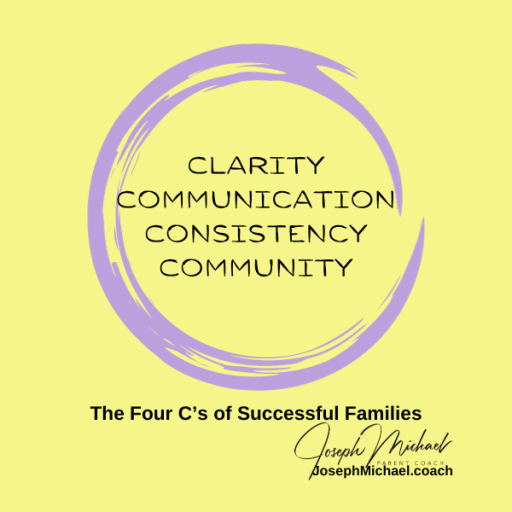
The Secret to a Calm Family Life: Embrace the Four C’s of Success

The Four C’s of Successful Families
Implementing the Four C’s of Successful Families—Clarity, Communication, Consistency, and Community—can be a powerful way to integrate serenity into family dynamics. By focusing on these foundational principles, families can create an environment where peace, understanding, and mutual support flourish.
Here’s how each of the Four C’s can be practically applied to bring more serenity into your family life:
1. Clarity: Establishing Clear Values and Expectations
Why Clarity Matters: Clarity is about understanding the values and virtues your family wants to live by. When everyone knows what is important, it reduces confusion, miscommunication, and conflict, leading to a more serene and harmonious home environment.
Practical Implementation:
-
- Family Meetings: Hold regular family meetings to discuss and agree on your core family values. These can include values like respect, kindness, honesty, and calmness. Make sure that every family member understands and agrees with these values.
- Setting Clear Expectations: Clearly define what each value means in practice. For example, if serenity is a core value, discuss what it looks like in everyday situations, such as handling disagreements or responding to stress. Setting clear expectations helps everyone know how to act in a way that supports a serene environment.
- Visual Reminders: Create visual reminders of your family values and place them around the home. For example, a family mission statement displayed in a common area or a list of core values on the fridge. These reminders help keep everyone focused on what truly matters.
How It Promotes Serenity: When values and expectations are clear, family members can confidently navigate daily life, knowing how to behave and what is expected of them. This clarity reduces potential misunderstandings and conflicts, creating a more peaceful and serene family dynamic.
2. Communication: Enhancing Clear and Effective Communication
Why Communication Matters: Effective communication is essential for maintaining serenity in family life. It ensures that everyone feels heard, understood, and respected. When communication is clear and open, it fosters trust and reduces tension.
Practical Implementation:
-
- Active Listening: Encourage all family members to practice active listening. This means fully concentrating on the speaker, not interrupting, and responding thoughtfully. Active listening helps ensure that everyone feels valued and understood.
- Regular Check-Ins: Schedule regular check-ins where family members can openly share their thoughts, feelings, and concerns. This could be a daily conversation at dinner or a weekly family discussion. These check-ins provide a space for open communication and help prevent issues from festering.
- Nonverbal Communication: Pay attention to nonverbal cues like body language and tone of voice. Encourage family members to be mindful of how they communicate nonverbally, as these cues can significantly impact the emotional tone of interactions.
How It Promotes Serenity: Clear and effective communication minimizes misunderstandings and resolves conflicts before they escalate. When everyone in the family feels heard and understood, it fosters a serene atmosphere where issues can be addressed calmly and constructively.
3. Consistency: Applying Values and Rules Consistently
Why Consistency Matters: Consistency in applying values, rules, and consequences is crucial for maintaining a stable and serene family environment. When expectations are consistently upheld, it creates a sense of security and fairness for all family members.
Practical Implementation:
-
- Consistent Routines: Establish consistent daily routines that align with your family values. For example, if calmness is a value, include daily quiet time or relaxation activities in your routine. Consistent routines help create a predictable and stable environment that supports serenity.
- Fair and Predictable Consequences: Ensure that rules and consequences are applied consistently. If a family rule is broken, follow through with the agreed-upon consequence every time. This consistency reinforces the importance of the rules and reduces the potential for conflict.
- Modeling Behavior: Parents and caregivers should model the values and behaviors they expect from their children. Consistently demonstrating calmness, patience, and respect in your interactions sets a powerful example for your children to follow.
How It Promotes Serenity: Consistency provides a sense of stability and fairness, which is essential for a serene family life. When everyone knows what to expect and can rely on consistent application of values and rules, it reduces anxiety and promotes a peaceful home environment.
4. Community: Building a Supportive Network
Why Community Matters: Community involves connecting with others who share your family’s values and can provide support, encouragement, and a sense of belonging. A strong community reinforces your family’s commitment to serenity and provides additional resources for maintaining it.
Practical Implementation:
-
- Connecting with Like-Minded Families: Build relationships with other families who share similar values and prioritize serenity. This could be through social groups, religious communities, or neighborhood associations. These connections provide mutual support and opportunities for shared activities that reinforce your values.
- Participating in Community Activities: Engage in community activities that promote serenity, such as mindfulness workshops, nature walks, or family-friendly yoga classes. These activities allow your family to connect with others while practicing serenity in a communal setting.
- Seeking Support: Don’t hesitate to seek support from your community when needed. Whether it’s advice, emotional support, or practical help, having a strong community network ensures that your family has the resources it needs to maintain serenity during challenging times.
How It Promotes Serenity: A supportive community helps reinforce your family’s commitment to serenity by providing encouragement, shared experiences, and a sense of belonging. Being part of a community that values peace and calmness strengthens your family’s ability to maintain these virtues in your daily life.
Incorporating serenity into family dynamics is a powerful way to create a peaceful, harmonious home where everyone can thrive. By implementing the Four C’s—Clarity, Communication, Consistency, and Community—families can build a strong foundation that supports serenity in every aspect of life. These practical strategies not only help maintain peace within the family but also foster deeper connections, emotional resilience, and a shared commitment to living a life guided by positive values. As you integrate these principles into your family life, you’ll find that serenity becomes a natural and sustaining force, enhancing the well-being and happiness of every family member.
Joe is a husband, father, grandfather, author, speaker, educator, course creator, and parent/family coach.
He helps parents develop unity, find clarity, communicate, and develop consistency in their parenting with the Four C’s of Successful Families. You can find his work on social media.
In addition, the Four C’s newsletter is enjoyed by many as it encourages parents to self-care, build their relationships with their partners, and raise their children.
And he loves to golf!

